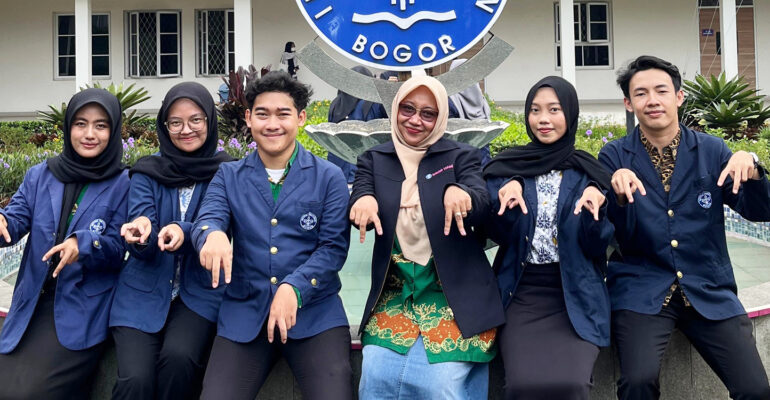IPB University Students Invent Nilet, A High-Nutrient Vegetable Waste-Based Tilapia Pellet

A number of IPB University students have created Nilet, a vegetable waste-based tilapia pellet innovation. Nilet is a tilapia floating pellet product that successfully converts kale vegetable waste, papaya vegetable, cassava vegetable, and Lemna sp weed. The high protein content in this product can accelerate growth and development so as to shorten the tilapia harvest period.
Nilet is an innovative product made by a team from IPB University’s Student Creativity Programme for Entrepreneurship (PKM-K) led by Irfan Manaf, with members Evita Maharani, Lintang Ashfa, Hanifah Adha, and Fajar Maulady. The success of this team in making innovations cannot be separated from the guidance of the accompanying lecturer, Ivonne Wulandari Budiharto SSi, MSi.
“Nilet was inspired by the large amount of waste from vegetables that are not suitable for sale in the market that are dumped and piled on the side of the road before being transported to the landfill (TPS), causing a lack of aesthetics and a pungent odour when walking around the pile of garbage,” said Irfan, team leader.
He further elaborated that Nilet is used for tilapia fish measuring 7-8 cm with a pellet size of 2 mm. This product has a simple and identical design. Nilet has the advantage of accelerating the tilapia harvest period by 3,5 months, economical price, minimal chemicals, and maintaining fish resistance to disease. Nilet has three packaging variants, namely 1 kg, 5 kg, and 25 kg.
He said the background to the creation of Nilet was based on the fact that in Indonesia, organic waste is currently the largest contributor to the waste pile. Data from the National Waste Management Information System in 2022, organic waste in Indonesia reached 68,43 per cent. As much as 39,62 per cent of it is food waste, including vegetable waste.
Some of the vegetable waste in the market are papaya leaves and cassava leaves. Based on data from the Central Statistics Agency (BPS) in 2022, Indonesia’s total vegetable production reached more than 15 million tonnes including cassava leaves, papaya leaves, and kale production reached 329,616 tonnes per year.
In addition, fisheries is one of the most important subsectors in Indonesia. In 2022, the fisheries subsector is estimated to contribute 2,80 per cent (IDR 431 trillion) to gross domestic product (GDP). In addition, this subsector also contributes to the creation of national food security.
Tilapia (Oreochromis niloticus) is a high-value seafood product that has the potential to be developed to support national food security. Based on the composition of production in the first quarter of 2022, tilapia is the most produced aquaculture seafood product at 35.,000 tonnes.
Therefore, Irfan emphasised that Nilet provides solutions for the environment, tilapia farmers, and the tilapia consumption community. More information about Nilet can be seen on the official Instagram account @nilet.inc. (*/Rz) (IAAS/RSL)



